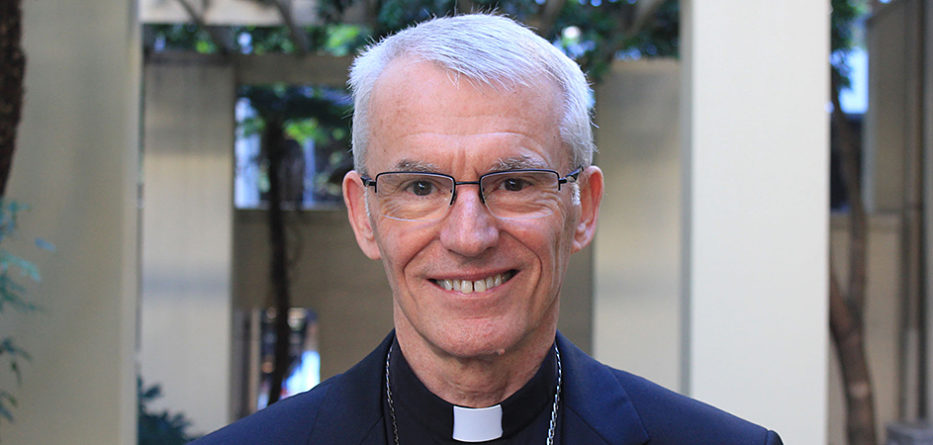Australian Catholic Bishops Conference President, Archbishop Timothy Costelloe SDB, delivered an address at the Theological-Pastoral Forum for the Synod in Rome on October 16.
The forum was held in the auditorium of the Jesuit Generalate, looking at the topic ‘Synodality and the Primacy of the Bishop of Rome’. Read his full address below.
My task this evening is to share some thoughts with you, based on my own pastoral experience as a diocesan bishop and as a member of the Synod, on the relationship between the role of the Bishop of Rome and the role of the body of bishops gathered in the Synodal Assembly together with lay women and men, religious, and other clergy: in essence we are reflecting on the realities and the possibilities of the network of relationships which hold together synodality, collegiality and the exercise of the primacy.
I would like to approach this task by highlighting some of what we might call the novelties of the present Synodal process.
This process itself holds a key to understanding how the Synod of Bishops can be of service to the pope in his role and also of assistance to the bishops themselves.
How can these relationships be developed as we ask ourselves the central question of the Second Assembly: how are we to be a missionary, synodal Church?
More specifically, we are being invited to consider questions such as these: How can the Synod of Bishops, as it is being experienced in the present Synodal Assembly and the present Synodal process, assist in a fruitful exercise of the primacy in its particular service to the Church?
How might it develop in ways that would make the primacy even more fruitful? How can the process of circularity between all the people of God, the bishops, and the Bishop of Rome, be further developed?
How can we deepen the threefold dynamic interplay between synodality, collegiality and the primacy?
Local experience
My own experience of this three-fold dynamic interplay encompasses both my involvement in the current synodal process and in the preparation and conduct of the recent Plenary Council of the Church in Australia.
That Council was a local experience which, particularly in terms of its structure and procedures, anticipated the present Synod.
Both experiences, overwhelmingly positive, have alerted me to the very real danger that what should be a circular process can easily become a linear process: in such a scenario the first stage of the process is to consult the faithful, the second stage of the process is for the bishops to discern the presence or otherwise of harmony between what the faithful have said and what the Church teaches, and the third stage of the process is to submit the eventual conclusions, proposals and decisions to the pope for approval.
The problem with this understanding is not that it is completely wrong, but rather that it separates into three distinct groups the faithful (which in this understanding often does not, for many people, include the bishops or the priests), the bishops who act as judges and even censors of what the people have said, and the Pope who simply receives at the end the final outcomes in which he himself has previously had little part to play.
Such an approach, if too rigidly followed, perpetuates a pyramidal structuring of the Church. Such a structure is not in harmony with the vision of Pope Francis, or with the theology of Vatican II.
It certainly only addresses superficially the pope’s insistence that synodality requires mutual listening: A synodal Church is a Church which listens…. The faithful People, the College of Bishops, the Bishop of Rome: all listening to each other; and all listening to the Holy Spirit (Francis, Ceremony Commemorating the 50th Anniversary of the Institution of the Synod of Bishops, AAS 107 [2015] 1140).
This concept of mutual listening has guided the Synodal journey from the beginning, in two very significant ways.
Unfolding process
The first is the extent of the consultation of the People of God, which did not simply constitute the first moment in the process but has continued to be an element of the process as it unfolds.
We are familiar with the ways in which at each stage of the synodal journey the results of the ongoing reflection and discernment on the initial world-wide consultation were returned to the local Churches for further reflection: there was the Frascati document, the contributions from the Continental Assemblies, the reflections on the Instrumentum Laboris for the First Assembly and the further reflections on the final document of the First Assembly.
Finally, there is the Instrumentum Laboris for the Second Assembly which represents the fruits of this long process, and the point of departure for our further reflections presently underway.
The second “novelty”, if I can use that word, is the decision of the Holy Father to open membership of the Synod not only to bishops but also to lay women and men, to religious, and to deacons and priests.
Previously such people, relatively few in number, were there as observers. Now they are fully voting members. Further, they are no longer relegated to the back places as they were in the hierarchical model of previous synods but sit together with bishops at round tables.
This all speaks powerfully of the unity and equality which, because of baptism, constitutes the Church as a community of missionary disciples. At the same time, the presence of “non-bishops” at the Synod of Bishops reminds everyone present that within this community, and not apart from it, the bishops have a particular role to play.
As Vatican II teaches, each bishop in his diocese is ordained to be the visible principle of unity for his local Church; the bishops together have a responsibility to maintain the communion of their own local Church with other local Churches; and the Bishop of Rome, who presides over the Universal Church in charity, is commissioned to be the visible principle of unity for the whole Church.
Unity at the heart
In one sense there is nothing new about placing communion and unity at the heart of the Church’s identity and mission. The Second Vatican Council spoke authoritatively about this when, in the opening paragraph of Lumen Gentium, it spoke of the Church as being “in the nature of a sacrament, a sign and instrument that is, of communion with God and of unity among all people”.
Even more authoritatively, the Johannine Jesus spoke of this when he prayed at the Last Supper that all his disciples might be one as he and his Father are one (cf. John 17:20-23).
What the present Synod represents is a renewed focus on this essential dimension of the Church’s identity. This focus invites us all to reconsider both what unity means and what it calls each of us, as individual Christians and as members of the Church, to do and be.
It is here that the Synod of Bishops can play a vital role in assisting the Pope, and those who collaborate with him in the exercise of his universal primacy.
We are speaking of a unity which is really a communion of mind and heart, of spirit and action, and of belief, which is at the service of the Church’s evangelising mission. This is very different from an understanding of unity which equates it with uniformity, or solely with unity in belief, vitally important though this is.
Participating in the Synodal assemblies has been itself an experience of great diversity, of concrete catholicity, and of the extraordinary variety of social and cultural realities which constitute the lived experience of the Church.
An essential part of the ministry of the primacy, as Vatican II will insist, is to safeguard “legitimate differences while taking care that what is particular not only does no harm to unity but rather is conducive to it” (LG 13).
Fruit of listening
The Synod of Bishops is a privileged way in which the Bishop of Rome can listen deeply to the voices of the local Churches. What the pope should be hearing at the Synod is the fruit of listening in the local Churches and by the local Churches: and the fruit of that listening will be the considered discernment which has been and continues to be undertaken, and the consensus which is, or is not, emerging.
A key question then arises about whether the Synod of Bishops, both when it meets in General Assembly and as a permanent institution always at the service of the synodality of the Church, is suitably constituted and resourced to fulfil such a mission, which presumably goes beyond the already complex task of preparing for and animating the Synodal assemblies themselves.
Highlighting the pivotal issue of mutual listening leads directly to the question of the purpose of such listening which is, surely, to discern, as faithfully as possible, the will of God for the Church.
The synodal assembly is called together to be a true body of Christian discernment. This, I realise, is stating the obvious: it is what we sometimes call in English a “motherhood and apple pie” statement. No one could possibly disagree with it. However, if we dig a little deeper, to engage fully in Christian discernment requires both courage and humility.
The Synodal journey, and the Synodal Assembly, will be of real value to the pope if it is genuinely a process and an organ of discernment.
Let me explain what I mean. I spoke before about two novelties of the current synodal assembly: the extent and circular character of the consultation process, and the opening of full membership of the Synod assembly to “non-bishops”.
A third novelty is the methodology of discernment which the Synod has adopted: Conversations in the Spirit. This methodology could not be more different from the methodology of a parliamentary process, or a kind of referendum which is designed to settle an issue by ascertaining the majority view.
Conversations in the Spirit is designed to help people free themselves from rigid positions, personal opinions and prejudices in order to be open to the voice of the Spirit speaking not just through their experiences and convictions but also through the experiences and convictions of others.
Open to the Spirit
The key here is the phrase: open to the voice of the Spirit. Here, of course, is another “motherhood and apple pie” statement. What genuine Christian disciple could possibly be opposed to being open to the voice of the Spirit?
The crunch comes, of course, when an individual or a community realises that what they want for or from the Church, while it may well be exactly what God wants for the Church, might equally not be God’s plan for the Church.
The tendency to presume that my own deeply held convictions are in full harmony with God’s will is very strong in most of us. It can be confronting, and even humiliating, to come face-to-face with the realisation that this is not, or may not be, the case.
This is why the art of listening to the other, and listening deeply, is so central to the synodal journey. If we do not listen, and listen with open hearts and minds, then we have no chance of hearing what the Holy Spirit might be trying to say to us through the other.
What we hear may delight or dismay us, and will still need to be discerned, but we have to hear first, and then think, reflect and pray, all within the community of the Church, and bring all of this to the task of discernment. And we must be prepared to look with fresh eyes at things we had previously not been prepared to consider.
To the extent that the Synod as it continues to unfold succeeds in shifting us from a combative “winner takes all” approach to a genuine approach of openness to the Spirit “who blows where it will” (cf. John 3:8), to that extent the Synod as it is presently constituted, and the Synod as it develops over time, will be of enormous assistance to the exercise of the primacy as the Pope in his turn listens to the voice of the Spirit speaking in and through the synodal process, and brings his own prayerful discernment to what he is hearing.
I would like to conclude with a few practical observations and suggestions.
As synodality embeds itself more deeply in the life and practice of local Churches should the Synod Office itself be restructured so as to make it an office of communication and coordination between the local Church and the Roman Curia?
Seeking guidance
Could, for example, the process of recognitio required for such things as Plenary Councils be coordinated by the Synod Office? Could regular reports on the implementation of the Synod on Synodality be submitted through the Synod Office to the Holy Father?
Could such reports eventually become public documents? Could local initiatives be shared more widely through the Synod Office?
Pope Francis is certainly looking for help. “There is no doubt,” he once said, “that the Bishop of Rome is in need of the presence of his brother bishops, of their guidance and of their prudence and experience.
Indeed, the Successor of Peter must proclaim to all who ‘Christ, the Son of the Living God’ is, and at the same time he must pay attention to what the Holy Spirit inspires on the lips of those who — accepting the word of Jesus who declares: ‘you are Peter’ (cf. Mt 16:16-18) — fully participate in the Apostolic College” Letter of Pope Francis to the Secretary General of the Synod Of Bishops, 1 April 2014.
The Synod of Bishops, understood not just as an occasional event in the Church but as a permanent structure designed to facilitate greater collaboration and communication between the Bishop of Rome and his brother bishops scattered around the world, and possibly undertaking some of the tasks presently attended by the Dicastery for Bishops, could help recast the relationship between the primacy of the See of Peter, the Collegiality of the Apostolic College, and the synodality of the Holy People of God.
With thanks to the ACBC.








